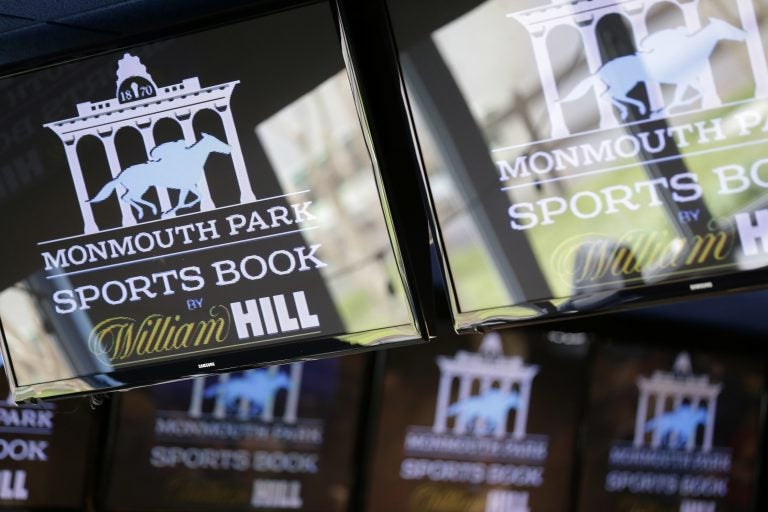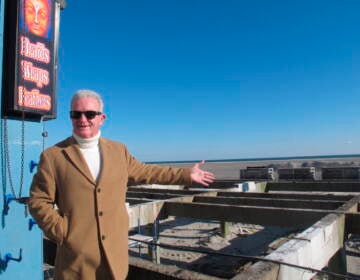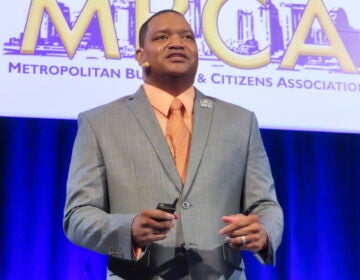N.J., Del., Pa. racing to implement sports betting after U.S. high court ruling
The U.S. Supreme Court ruled 6-3 to strike down the Professional and Amateur Sports Protection Act.

Signs for Monmouth Park are displayed in a bar at the racetrack in Oceanport, N.J., Monday, May 14, 2018. The Supreme Court on Monday gave its go-ahead for states to allow gambling on sports across the nation, striking down a federal law that barred betting on football, basketball, baseball and other sports in most states. (AP Photo/Seth Wenig)
The U.S. Supreme Court Monday gave its go-ahead for states to allow gambling on sports across the nation, striking down a federal law that barred betting on football, basketball, baseball, and other sports in most states.
The justices voted 6-3 to strike down the Professional and Amateur Sports Protection Act, a 1992 law that forbade state-authorized sports gambling with some exceptions. It made Nevada the only state where a person could wager on the results of a single game.
Many states have hoped their cut of legalized sports gambling could help solve budget problems. Stock prices for casino operators and equipment makers surged after the ruling was announced.
The ruling, in a case from New Jersey, creates an opening to bring an activity out of the shadows that many Americans already see as a mainstream hobby. The American Gaming Association estimates that Americans illegally wager about $150 billion on sports each year, and one research firm estimated before the ruling that if the Supreme Court were to strike down the law, 32 states would likely offer sports betting within five years.
Former New Jersey state Sen. Ray Lesniak has been fighting for years to bring legalized sports betting to the Garden State, and he said he’s thrilled with the court’s decision.
“It’s going to be a big boost for Atlantic City, a big boost for Monmouth Racetrack. It’ll bring people to those venues, keep jobs, create jobs, benefit the state of New Jersey,” he said. “We’re talking hundreds of millions of dollars a year.”
Gov. Phil Murphy said he’ll work with the Legislature on a law setting state regulations for sports wagering. And former Gov. Chris Christie said after arguments in the case in December that if justices sided with the state, bets could be taken “within two weeks” of a decision.
After the ruling was announced, the former Republican governor tweeted that it was a “great day for the rights of states and their people to make their own decisions.”
At the Jersey Shore, Monmouth Park has already up a sports book operation and has previously estimated it could take bets within two weeks of a favorable ruling.
Tony Rodio, president of Tropicana Entertainment, said his Atlantic City casino will “absolutely” offer sports betting once it can get it up and running. “It’s been a long time coming,” he said.
New Jersey Assemblyman John Burzichelli said he anticipates a vote on a measure setting out betting regulations as soon as next week.
That, he said, will give New Jersey a competitive edge until other states that will benefit from the Supreme Court ruling also approve sports wagering.
“Pennsylvania will act quickly. New York will act quickly. Delaware will act quickly. Maryland will act quickly. They all have casinos,” Burzichelli said. “So we’ll probably have a short advantage.”
Delaware officials are, indeed, ready to pounce.
While the state is likely to lose its monopoly on sports betting following the Supreme Court decision, operators of Delaware’s casinos hope to be the first in the region to offer expanded sports betting options.
Since 2009, Delaware’s casinos have taken “parlay” bets on NFL football games. Those bets were allowed because the state was grandfathered in under federal law that outlawed sports betting elsewhere on the East Coast.
And because it’s already been in the sports betting business, Delaware may be quicker to launch new betting options than its neighbors.
Delaware Park Casino president Bill Fasy said he expects to offer more wide-ranging bets on multiple sports by the end of June.
“We have the ability to process the games, we have the big video boards already in our clubhouse, those lead times alone may be six months away from a standpoint of anyone wanting to open up.”
Pennsylvania is also positioned at the starting gate; lawmakers passed a bill allowing sports betting as part of last year’s budget, before they knew whether the federal court would legalize it.
Now, it’s up to the state Gaming Control Board to figure out what’s allowed under the new ruling.
“We will work as a staff to promulgate and write regulations,” said Dough Harbach, spokesman. “We have temporary regulative authority, so we’ll get those done. We’ll put them before the board for approval. Only at that time would we start the process of accepting applications.”
Unlike New Jersey and Delaware, Pennsylvania has no concrete timeline for getting sports betting up and running.
‘Each state free to act on its own’
Justice Samuel Alito wrote for the court, “The legalization of sports gambling requires an important policy choice, but the choice is not ours to make. Congress can regulate sports gambling directly, but if it elects not to do so, each state is free to act on its own. Our job is to interpret the law Congress has enacted and decide whether it is consistent with the Constitution. PASPA is not.”
Justices Ruth Bader Ginsburg, Stephen Breyer and Sonia Sotomayor dissented. Ginsburg wrote for the three that when a portion of a law violates the Constitution, the court “ordinarily engages in a salvage rather than a demolition operation,” preserving what it can. She said that instead of using a “scalpel to trim the statute” her colleagues used “an axe” to cut the remainder down. Breyer agreed with the majority of the court that part of the law must be struck down but said that should not have doomed the rest of the law.
The federal government and all four major U.S. professional sports leagues and the NCAA had urged the court to uphold the federal law, with the leagues saying a gambling expansion would hurt the integrity of their games. Those concerns are rooted in past gambling scandals. The leagues don’t want anyone thinking the outcome of their games could be altered by someone with money on a certain result, and they argued that with legal sports betting in the United States they’d have to spend a lot more money monitoring betting patterns and investigating suspicious activity.
For now, at least, New Jersey officials do not intend to contribute any revenue that might come the state’s way as “integrity fees” that professional sports leagues are seeking.
Sports gambling proponents argue that the leagues already do that work and that legal sports betting will make enforcement easier than it is now, when most bets in the U.S. are made illegally. They say state regulators are capable of monitoring suspicious bets, as is done in Nevada.
On Monday, Major League Baseball issued a statement saying the Supreme Court ruling would have “profound effects” on the league and that it would “continue to seek the proper protections for our sport.”
NBA commissioner Adam Silver says the pro basketball league remains in favor “of a federal framework that would provide a uniform approach to sports gambling in sates that choose to permit it.” He said that “regardless of the particulars of any future sports betting law, the integrity of our game remains our highest priority.”
Representatives of the National Hockey League and National Football League had no immediate comment on the ruling, saying they were analyzing it. The NCAA’s chief legal officer said the organization is still reviewing the court’s decision but added that it “will adjust sports wagering and championship policies to align with the direction from the court.”
New Jersey has spent years and millions of dollars in legal fees trying to legalize sports betting. In 2012, with voters’ support, New Jersey lawmakers passed a law allowing sports betting, directly challenging the 1992 federal law. The four major professional sports leagues and the NCAA sued, and the state lost in court.
In 2014, New Jersey tried a different tactic by repealing laws prohibiting sports gambling at casinos and racetracks. It argued that taking its laws off the books was different from authorizing sports gambling. The state lost again and then took the case to the Supreme Court.
More than a dozen states had supported New Jersey in urging the Supreme Court to overturn the law.
___
WHYY reporters Mark Eichmann, Katie Meyer, and Phil Gregory contributed to this report. Associated Press reporter Wayne Parry contributed reporting from Atlantic City, New Jersey, Ben Nuckols contributed from Washington and Steve Megargee contributed from Knoxville, Tennessee.
WHYY is your source for fact-based, in-depth journalism and information. As a nonprofit organization, we rely on financial support from readers like you. Please give today.




